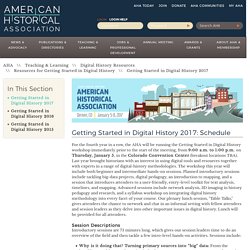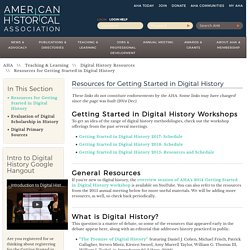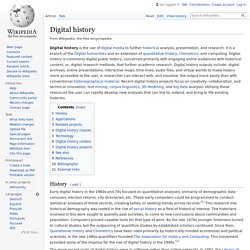

A Digital World – Engaging in online public discourse about digital history. Getting Started in Digital History 2017: Schedule. Getting Started in Digital History 2017: Schedule For the fourth year in a row, the AHA will be running the Getting Started in Digital History workshop immediately prior to the start of the meeting, from 9:00 a.m. to 1:00 p.m. on Thursday, January 5, in the Colorado Convention Center (breakout locations TBA).

Last year brought historians with an interest in using digital tools and resources together with experts in a range of digital-history methodologies. The workshop this year will include both beginner and intermediate hands-on sessions. Planned introductory sessions include tackling big-data projects, digital pedagogy, an introduction to mapping, and a session that introduces attendees to a user-friendly, entry-level toolkit for text analysis, timelines, and mapping. Advanced sessions include network analysis, 3D imaging in history pedagogy and research, and a syllabus workshop on integrating digital history methodology into every facet of your course.
Resources for Getting Started in Digital History. Resources for Getting Started in Digital History These links do not constitute endorsements by the AHA.

Some links may have changed since the page was built (2014 Dec). Digital history - Wikipedia. Digital history is the use of digital media to further historical analysis, presentation, and research.

It is a branch of the Digital humanities and an extension of quantitative history, cliometrics, and computing. Digital history is commonly digital public history, concerned primarily with engaging online audiences with historical content, or, digital research methods, that further academic research. Digital history outputs include: digital archives, online presentations, interactive maps, time-lines, audio files, and virtual worlds to make history more accessible to the user.
A researcher can interact with, and visualise, the output more easily than with conventional historiographical material. Recent digital history projects focus on creativity, collaboration, and technical innovation, text mining, corpus linguistics, 3D Modeling, and big data analysis. Create a map.